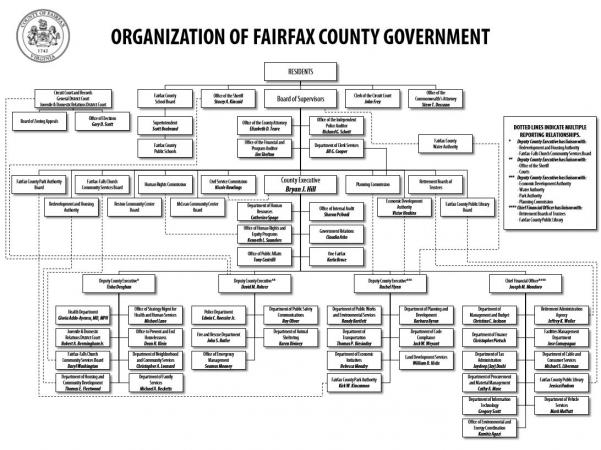Form of Government
Fairfax County operates under the urban county executive form of government, an optional form of Virginia county government.
The powers of government are vested in an elected Board of Supervisors consisting of nine members elected by district, plus a Chairman elected at large.
Board members are elected for four-year terms. There is no legal limit to the number of terms a member can serve.
The Board appoints the County Executive, who is the administrative head of the county government and is responsible for the administration of all of the affairs of the county which the Board has authority to control.
The County Executive's Office focuses on strategic planning, ensuring and valuing excellence in public service, fostering partnerships with our residents and community leaders, preparing the annual budget and executing all resolutions and orders of our elected Board of Supervisors.
Fairfax County Fast Facts Videos
Welcome to Fairfax County, Virginia
What We Do
How Our Budget is Built in Fairfax County
Who Represents You in Fairfax County
What Taxes Do We Pay in Fairfax County?
Stay Connected with Your County
County Government Structure
County government responsibilities are shared across different departments and agencies, which provide many services you use every day:
- police
- fire and rescue personnel
- public transportation we take to work
- health clinics
- recreation centers for our enjoyment
- libraries for books or doing research
- and disposal facilities for our trash
Limited Powers
Like other Virginia local governments, Fairfax County has limited powers. More specifically, Virginia courts have concluded that local governments in Virginia have only:
- Those powers that are specifically conferred on them by the Virginia General Assembly
- Those powers that are necessarily or fairly implied from a specific grant of authority
- Those powers that are essential to the purposes of government -- not simply convenient but indispensable
The Dillon Rule is used in interpreting law when there is a question of whether or not a local government has a certain power. The Dillon Rule narrowly defines the power of local governments. It also states that if there is any reasonable doubt whether a power has been conferred on a local government, then the power has NOT been conferred.
Home Rule Authority
The Dillon Rule as a concept is found in all states – meaning that apart from the power ceded to the federal government in the U.S Constitution, the state governments have all the remaining governmental authority. However, most states have adopted various types of “home rule” provisions that permit some or all of their local governments to undertake those governmental functions that are not specifically precluded by the laws of those home rule states. Virginia has not provided such home rule authority to its local governments.
The Virginia Supreme Court and other Virginia courts routinely apply the Dillon Rule to determine whether or not a local government has the legal authority to undertake a disputed action. For well-established county functions, like planning, zoning, and taxation, there are a number of statutes that give the county clear direction and authority to act, but in new areas of governmental concern, the Dillon Rule can serve as a constraint to innovative governmental responses.
This means that Fairfax County has limited powers in areas such as raising revenue, and it cannot take certain actions without appropriate action from the state, which limits revenue diversification options among other things.


